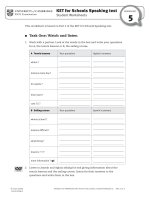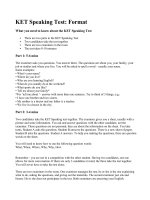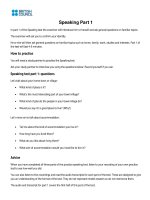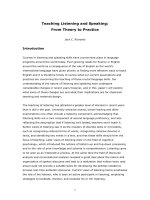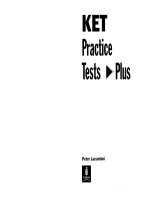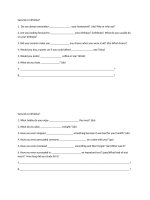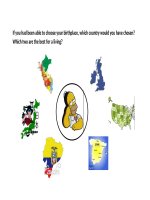practice speaking ket
Bạn đang xem bản rút gọn của tài liệu. Xem và tải ngay bản đầy đủ của tài liệu tại đây (65.36 KB, 5 trang )
Future version (from 2020)
Phase 1
The first part. In which you need to give a simple answer
from one sentence
What’s your name?
What’s your surname?
How do you spell your surname?
How old are you?
What's your date of birth?
Which school do you go to?
How many brothers and sisters do you have?
Where do you live?
Where do you come from?
Where are you from?
What’s your nationality?
Phase 2
The second part is structured in such a way that the
candidates take turns answering the examiner's
questions. The two types of questions are open and
closed. In the previous version of the exam, the candidate
was asked to talk on one topic, now on one topic he will be
asked two closed questions, and on the second - two
closed and one open.
Closed questions involve short answers.
Now, let's talk about your day at school.
What time do you go to school each day?
What is the first thing you do when you get to school?
How many lessons do you have each day?
What time do you finish school?
Now, let's talk about your families.
How many people are there in your family?
Who is the oldest person in your family?
Where do the people in your family live?
When will you next see your family?
Now, let's talk about hobbies.
What hobbies do you enjoy doing in your spare time?
Where do you do your favourite activities?
How often do you do your favourite hobby?
What hobbies do other people in your family enjoy?
Now, let's talk about your school subjects.
What subjects do you study at school?
When did you start learning English?
Which foreign languages are your studying at your school?
How often do you have maths lessons?
Now, let's talk about different times of the year.
What seasons are there during the year in your country?
Which time of the year is special in your country?
When are the school holidays in your country?
What is the weather usually like in December in your country?
Now, let's talk about food.
Who cooks the food in your family?
What kind of food do you eat every week?
What are the cafes like in your town?
Where does your family buy food from?
Now, let's talk about weekends.
When does the weekend start for you and your family?
What do you usually do at the weekend?
What will you do next weekend?
Do all of your family have free time every weekend?
Now, let's talk about transport.
How do you like to travel if you are going on a long journey?
How often do you ride a bike in your town?
What do you like about travelling by train?
How often are there traffic delays in your town?
Now, let's talk about reading.
How often do you read for fun?
What kind of things do your friends like reading?
What was the last thing that you read online?
How old were you when you learnt to read?
Now, let's talk about the internet.
What can you learn on the internet?
Do you prefer using a phone or a computer to go on the internet?
How often do you chat online with your friends?
What do you like doing most on the internet?
Now, let's talk about learning languages.
What other languages can you learn at your school?
When did you start learning English?
How many English teachers have you had at your school?
What do you find difficult about learning English?
Now, let's talk about watching things on the internet.
How often
What kind
What kind
How often
do you watch things on the internet?
of things on the internet make you laugh?
of music videos do you like watching on the internet?
have you seen your friends in online videos?
An open question to which a detailed answer of three or more sentences
should be given:
Tell me something about what you like about your school.
My school is quite near here. It’s …
Tell me something about a meal that you enjoy eating.
I like pizza. I eat lots of …
Tell me something about a hobby that you enjoy doing.
I like playing basketball. I usually play …
Tell me something about how your family spend time together.
Tell me something about your favourite subject at school.
Tell me something about your favourite time of the year.
Tell me something about what you did last weekend.
Tell me something about how you travelled to school yesterday.
Tell me something about something that you have enjoyed reading.
Tell me something about what you like doing on the internet.
Tell me something about an English lesson that you enjoyed.
Tell me something about something good that you watched on the
internet.
Starting and asking your partner: ( bắt đầu cuộc hội thoại)
Let's start with this one, shall we?
Shall we start with this one?
không?
So, what do you think of……..?
Do you think that's a good idea/place
không?
: Chúng ta hãy bắt đầu với cái này nhé!
: Chúng ta bắt đầu với cái này được
: Bạn nghĩ sao về ……?
to go? Bạn có nghĩ nơi này tuyệt để đi
Asking for opinions: (hỏi ý kiến của bạn mình)
Do you enjoy...?
: Bạn
Do you like...?
How about you?
:Còn
Do you agree with me?
What do you think?
: Bạn
That's a good idea/place….., isn't it?
có thích……..?
: //
bạn thì sao?
: Bạn đồng ý với tôi không?
nghĩ sao?
: Đó là một nói tuyệt để đi, đúng không?
Agreeing: (đồng ý với ý kiến của bạn mình)
I agree with you
Yes, I think so too
You are right.
That's a great / good idea.
That's a good point.
I see what you mean
: Tôi đồng ý với bạn
: vâng, tôi cũng nghĩ vậy
: Bạn nói đúng
: ý hay đấy
: //
: Tôi hiểu ý của bạn
Disagreeing: (không đồng ý với ý kiến của bạn mình)
I don’t agree with you
I don’t think so
Maybe, but I………….
It's a good idea/place to go, but ...
Well, I'm not sure about that.
I don't think I would ...
I'm not sure I would ...
:
:
:
:
:
:
:
Tôi không đồng ý với bạn
Tôi không nghĩ vậy
có lẽ là vậy , nhưng tôi………..
Đó là một nơi tuyệt để đi, nhưng………
Tôi không chắc về điều đó lắm
Tôi không nghĩ là tôi sẽ……
Tôi không chắc là tôi sẽ……
Giving opinions: (đưa ra ý kiến của mình)
I think this is a good place/idea
: Tôi nghĩ đó là một nơi tuyệt
I prefer.........
: Tôi thích…….
As for me, I really like.......
: Đôi với tôi, tôi rất thích……
As for me, I don't really like...
: Đối với tôi, tôi không thích…..
As for me, I love / enjoy / hate…….
: Đối với tôi, tôi yêu / ghét……
Giving reasons: (đưa ra lý do)
... so…….
:……vi vậy….
... because ...
: ……bởi vì….
... that's the reason why ...
:…….đó là lý do tại sao tôi……
…..therefore,….
:……do đó…..


